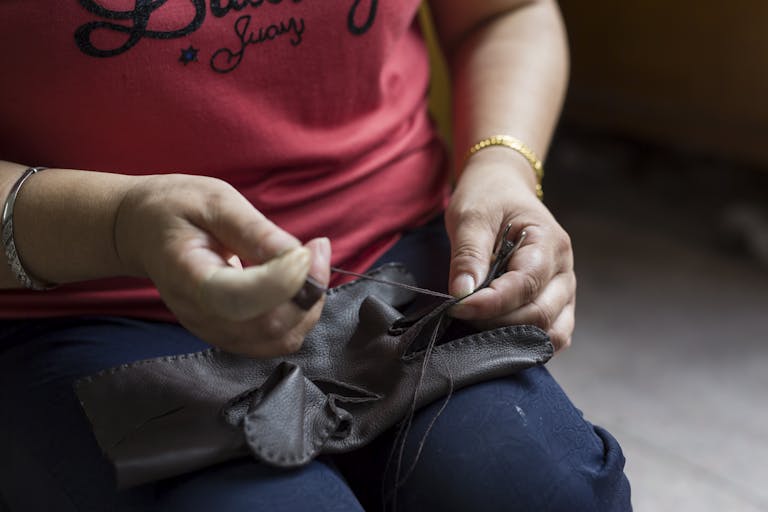Factories
Factory China, Pinghu
A life devoted to gloves
Hestra has been producing its quality gloves just outside the Chinese city of Shanghai for several decades now, and back in 2011 decided to launch a joint venture with its most important supplier. It’s a tale of gloves uniting Småland entrepreneurship with Chinese craft traditions.
Zhang has dedicated his life to gloves. He learned the craft more than half a century ago from one of China’s most renowned glove-makers at the Shanghai No. 4 Leather Products Factory, before beginning his career as a technician at the Pinghu factory, which he now manages.
Zhang witnessed first-hand the reforms in China in the 1970s, which brought change to both the country as a whole and his workplace. This included the privatisation of the large tannery that the glove-making factory belonged to and, as an eligible employee, he was given the chance to become a part-owner. He also got to experience the People’s Republic opening up to the world, and the first foreign companies looking for new production facilities in China’s important industrial region around the city of Shanghai.
One of the first customers was Hestra. They would play a significant role in both Pinghu’s and Zhang’s future. Every year this Swedish family company increased its order quantities and requested new models that required production solutions, which meant drawing on the know-how of Zhang and his colleagues. Ultimately, the Swedish gloves came to be manufactured exclusively at this factory.
When Zhang and Hestra established a joint venture to take over the factory in 2011, it felt like a natural progression, with the businesses both prospering – and it can be seen as a success story for both China’s economic liberalisation and Småland entrepreneurship.

ZHEJIANG PINGHU HUASHEN LEATHER CO, LTD - CHINA


Hestra and Pinghu have shaped each other for over four decades
says deputy Managing Director Kathy, who has been with the company since 1998, and previously worked at the state import-export agency.
Prior to the collaboration there were only a few models produced in pigskin. Then, Hestra’s designers began developing and producing new styles with our assistance, which proved successful on the market. In addition, we were using new types of leather such as deerskin, elkskin, goatskin, cowhide or lambskin, and later also synthetic water and heat-resistant materials such as Gore-Tex, for example
In the field of leather, Pinghu, with its expertise within tanning, has become a key partner and sounding board for the Swedish glove company. To this day, material issues are discussed with Zhang’s team, even though actual production may take place at any of the other four Hestra factories, in China, Vietnam, Hungary or Cambodia.
When purchasing leather, Hestra always asks for our opinion on optimal thickness or elasticity, and we are often responsible for producing prototypes
explains Kathy.



Up until the 1990s, Pinghu specialised in dress gloves. But the factory gradually began broadening its expertise within manufacturing of sports gloves, which required a brand-new kind of fit and production method:
Technical sports gloves have less give and are made from thicker material. The shape must therefore match the natural position of the hand, with the fingers always slightly curved
explains Kathy, demonstrating with her own hand.
This makes production much more complex than dress gloves, which are based on a flat hand, with almost the same top side and underside, using soft, thin leather that moulds to the shape of the fingers
In recent years, Pinghu’s technicians have created an in-house computer system for mechanical patternmaking. The company invested in CAD-controlled punching machines that accelerated production of the glove components and optimised the stitching processes. At the same time, procedures were established for internal training of employees.
Kathy, Managing Director
Now I am proud to have been able to contribute to Hestra’s growth, which has seen it become a world-renowned brand. I believe that many of my colleagues feel the same – it’s an honour that stays with you for the rest of your life
Today, Hestra Pinghu has a workforce of 128 and produces around 440,000 pairs of sports and dress gloves every year. The factory holds certification under the global ISO 9001 and ISO 14001 standards, which include annual reporting, and thus fulfils the most demanding of quality and environmental requirements. The factory is also affiliated with Amfori BSCI (Business Social Compliance Initiative), an international organisation that audits working conditions in the textile industry.
Furthermore, Kathy highlights the employee fund, which was set up when the company was privatised to ensure that the employees would benefit from the profits:
The fund is used today to support our employees and their families. For example, by helping out in the event of illness or to support children in their education
As a result of the good working conditions, there is a strong sense of loyalty among the employees. Many of them have been working at Pinghu and producing Hestra gloves for twenty, thirty or forty years.
When I joined the company over twenty years ago, I appreciated the constructive way in which Hestra and Pinghu worked together
says Kathy.